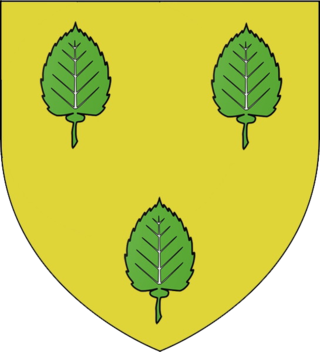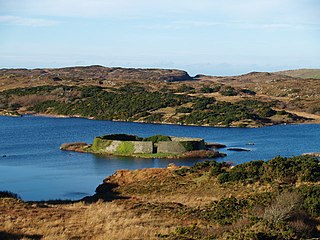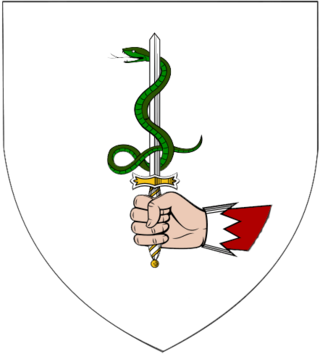A sept is a division of a family, especially of a Scottish or Irish family. The term is used in both Scotland and Ireland, where it may be translated as sliocht, meaning "progeny" or "seed", which may indicate the descendants of a person. The word may derive from the Latin saeptum, meaning "enclosure" or "fold", or via an alteration of "sect".

The O'Cahan were a powerful sept of the Northern Uí Néill's Cenél nEógain in medieval Ireland. The name is presently anglicized as O'Kane, Kane and Keane.
Gormley is an Irish surname. It is derived from the Gaelic Ó Goirmleadhaigh meaning 'descendant of Gormghal'. The main sept of the clan originated in Tyrconnell and then spread into Tyrone. The Ulster branch of the clan were chiefs of the Cenél Moain and originated in what is now the barony of Raphoe in East Donegal, an area known in Gaelic times as Tír Moain. The common ancestor and progenitor of these Gormleys was Moain son of Muireadach, son of Eoghan, son of Niall of the Nine Hostages.
The Conlon family is an Irish noble family, the original Gaelic spelling being Ó Connalláin. In the tenth and eleventh centuries, the O'Conalláin were Princes of Ui Laeghari, an extensive territory in the counties of Meath and Westmeath, where the High King of Ireland historically derived his seat at the Hill of Tara. The O'Conlons were chiefs of Crioch Tullach, in County Tyrone and branches of this family in the twelfth and thirteenth centuries settled in the counties of Roscommon, Galway and Mayo. As a sept of the Northern Uí Néill, they claim descent from Niall of the Nine Hostages and his son Conall Gulban, both High Kings of Ireland.

The O'Doherty family of County Donegal is an Irish clan who were a prominent sept of the Northern Uí Néill's Cenél Conaill, and one of most powerful clans of Tír Connaill.

Irish clans are traditional kinship groups sharing a common surname and heritage and existing in a lineage-based society, originating prior to the 17th century. A clan included the chief and his patrilineal relatives; however, Irish clans also included unrelated clients of the chief.

The Gallagher family of County Donegal, formerly one of the leading clans of Cenél Conaill, and therefore of all Ulster, originated in the 10th century as a derivative of their progenitor Gallchobhar mac Rorcain, senior-most descendant of Conall Gulban, son of Niall Mór Noigíallach. The O'Gallaghers held the High Kingship of Ireland during the early medieval period. They also held the rank of hereditary Marshal of the Kingdom of Tyrconnell, ruled by their kinsmen the O'Donnells, from the 14th until the early 17th century.
During the Tudor conquest of Ireland (c.1540–1603), "surrender and regrant" was the legal mechanism by which Irish clans were to be converted from a power structure rooted in clan and kin loyalties, to a late-feudal system under the English legal system. The policy was an attempt to incorporate the clan chiefs into the English-controlled Kingdom of Ireland, and to guarantee their property under English common law, as distinct from the traditional Irish Brehon law system. This strategy was the primary non-violent method for Crown officials in the Dublin Castle administration to subjugate Irish clan leaders during the conquest. It was an unanticipated consequence to be required to pay fealty in currency instead of trade labor or commodities. The process of "surrender and regrant" thus created new, unfamiliar debt structures among the Irish, and these debts had social and political consequences.

O'Cleary or O'Clery is the surname of a learned Gaelic Irish family. It is the oldest recorded surname in Europe — dating back to 916 AD — and is cognate with cleric and clerk. The O'Clearys are a sept of the Uí Fiachrach dynasty, who ruled the Kingdom of Connacht for nearly two millennia. As Connachta, the O'Cleary's ruled the kingdom of Uí Fiachrach Aidhne for nearly 800 years. They are the descendants of Fiachrae, son of the High King Eochaid Mugmedon, and elder brother of legendary High King Niall of the Nine Hostages. According to legend, they ultimately trace their ancestry back to the mythical Fir Bolg, as well as to Milesius, and consequently to Japheth, son of Noah.
Curry is a common surname used in Ireland, Scotland and England. Currey is a less common variant. In England and Scotland, the is thought to derive from local place names and, in Scotland, also possibly from MacMhuirrich.
Garvey and O'Garvey are Irish surnames, derived from the Gaelic Ó Gairbhith, also spelt Ó Gairbheith, meaning "descendant of Gairbhith". Gairbhith itself means "rough peace".

The O'Boyle family of County Donegal were a clan of the Northern Uí Néill, a great tribal dynasty of the North Gaels descended from Niall of the Nine Hostages. The O'Boyles were one of the principal families of the Cenél Conaill within the Northern Uí Néill and originally Chiefs of the Three Tuaths in the northwest of Tír Chonaill. When these lands passed to The MacSweeneys, the O'Boyle became chiefs of Tír Ainmhireach, later to be known as Críoch Bhaoigheallach, or O'Boyles country, now the Barony of Boylagh.

The O'Donovans are an Irish family. Their patronymic surname derives from Irish Ó Donnabháin, meaning the grandsons or descendants of Donnubán, referring to the 10th century ruler of the Uí Fidgenti, Donnubán mac Cathail. During the 12th and 13th century, O'Donovan relations relocated from the Bruree/Croom area south to the Kingdom of Desmond and to Carbery, where they were a ruling family for centuries and played a role in the establishment of a feudal society under the MacCarthys. Other septs retreated into the southeast corner of the Ui Fidgheinte territory, reaching from Broadford/Feenagh to the Doneraile area. The northern septs of the O'Donovans did not use a White Rod as the family's position in their original territory was vastly eroded, while several septs of O'Donovans in the southwest territories were semi-autonomous flatha under the MacCarthy Reagh dynasty in Carbery, with the most notable being local petty kings. The family were counted among the leading Gaelic nobility of Ireland.

McGowan is an Irish and Scottish surname. It is an Anglicization of the Irish Mac Gabhann and Scottish surname Mac Gobhann. Belonging to the Uí Echach Cobo, located in modern-day County Down in the east of Ulster, they produced several over-kings of Ulaid. By the late 12th century, the English had expelled the McGowans to Tír Chonaill in the west of Ulster, to Breffny and to Galloway in Scotland.
Moloney is a surname of Irish origin. Its Irish translation is Ó Mhaoldomhnaigh of Ni Mhaoldomhnaigh (female). This Irish surname is of true Gaelic stock and is seldom found with the original prefix 'O'. They were a powerful Dalcassian sept who were Chiefs of Kiltanon near Tulla in County Clare, spreading to the adjoining counties of Limerick and Tipperary, where today they are to be found in their greatest numbers.

O'Dwyer, also known as Dwyer,Dyer is one of Ireland's oldest Gaelic noble or aristocratic houses, based most prominently in what is today County Tipperary. The name means "dark coloured", in reference to their progenitor Dubhuir mac Spealáin's hair colour.
McKinley, MacKinley or Mackinlay is a Scottish and Irish surname historically associated with northwestern Ireland's County Donegal, the over-kingdom of Ulaid in northeastern Ireland and the Scottish Highlands.
The Cenél nEógain are a branch of the Northern Uí Néill, who claim descent from Eógan mac Néill, son of Niall of the Nine Hostages. Originally their power-base was in Inishowen, with their capital at Ailech, in modern-day County Donegal in what is now the west of Ulster. Under pressure from the Cenél Conaill, they gradually spread their influence eastwards into modern counties Tyrone and Londonderry, pushing aside the Cruithin east of the River Bann, and encroaching on the Airgiallan tribes west of Lough Neagh. By the 11th century their power-base had moved from Ailech to Tullyhogue outside Cookstown, County Tyrone. By the 12th century the Cenél Conaill conquered Inishowen; however, it mattered little to the Cenél nEóghain as they had established a powerful over-kingdom in the east that had become known as Tír Eoghain, or the "Land of Owen", preserved in the modern-day name of County Tyrone.